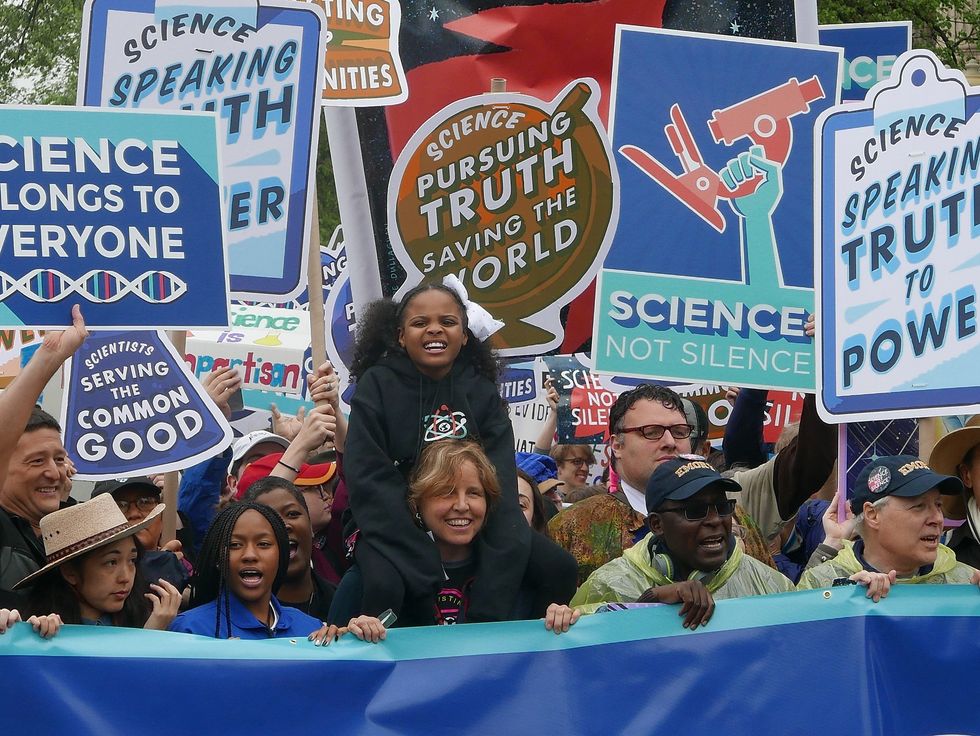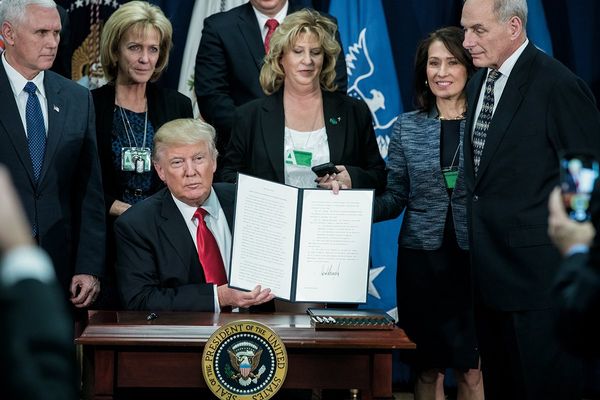project 2025
Op-ed: We mobilized to defend the EPA in Trump's first term. This time the stakes are even higher.
The rules as we understand them are changing before our eyes.
In early 2017 when the Trump administration was just starting to reveal its true intentions, I and other U.S. Environmental Protection Agency alumni formed a resistance organization to mobilize a defense for our former EPA colleagues and the mission to which they, and we, had devoted our professional lives.
We fact-checked the Trump administration’s version of environmental protection and defended the integrity of the agency and its personnel. We provided critical information to reporters, environmental organizations and Capitol Hill.
I walked away when the Biden-Harris administration took power. The EPA was liberated to do its job, to continue the path that had been set decades before in the Nixon administration and pretty much continued since, with the glaring exception of the Trump years (and the first couple of years of Reagan, thank you, Anne Gorsuch).
We are now facing another period of uncertainty. One potential outcome of the upcoming election is continued normalcy in which the EPA does its job (albeit under the surveillance of an unsympathetic Supreme Court; thank you, Neil Gorsuch).
Another possible outcome is the chaos and brutality set out in Project 2025, which would dismantle the expertise of the career civil service and set progress back to the time before we recognized that pollution does not respect state lines and that every citizen is entitled to environmental protections, wherever they live. Project 2025, a conservative blueprint that Trump has disavowed but was, in part, crafted by several former Cabinet members of his first administration, would give “the primary role in making choices about the environment” back to state governments. It would remove climate protection from the EPA’s to-do list.
As we have already lived through this sad drama, I went back and read what I wrote two years ago in the Democracy Journal about the organization we established to fight for environmental protections. Just as a reminder of what can and likely will happen with a Trump second term, I’d suggest you do as well.
The article describes the various attacks on both the substance and the process of environmental protection. It describes the tremendous effort it took to document and fight. The entire enterprise was predicated on the assumption that facts are facts and that making those facts available to people through a free press would be sufficient to help mobilize resistance and engage rationality, that information would help people understand what was at stake and nudge them toward action.

March for Science rally in Washington DC, April 22, 2017.
Credit: Susan Melkisethian/Flickr
To some extent, we had a bit of an advantage because the folks who were assigned by the first Trump administration to carry out this carnage were mostly novices. They had never before torn down government institutions.
Project 2025 shows they aren’t novices anymore. They have a better understanding of the levers of power and how things get done in the federal government. They are primed and ready to do serious damage, should they get the chance.
In the last part of that article, I tried to think about whether the business model for our effort could work if the agency were again under attack. I have no doubt that EPA alumni could be mobilized. And there are still reporters willing to shine a light on injustices and violations of law.
Where I have doubt is whether the circumstances are so different that the same theory of the case and the same tools would be insufficient.
In 2017-2021, we could reasonably hope that Trump and Trumpism were temporary. A second round of Trump could “mean that we have misread our own country,” as I wrote, which would make it harder to organize and to keep up our spirits this time around.
There are so many uncertainties, such cratering of principles we thought we could rely on in our effort.
What does a second Trump election with his myriad lies say about the power of facts and truth? What happens to the EPA when its cadre of scientists, analysts, lawyers, economists and other specialists are removed from their jobs or intimidated? How can advocates for clean air and clean water rely on an increasingly dysfunctional Congress to provide the minute and specific instructions apparently required now that the Chevron doctrine has been disposed of? Does a Trump-dominated EPA even try to carry out its statutory duties, much less try to work its way around the restrictions recently placed on it by the Supreme Court?
As I said in my analysis, the rules as we understand them are changing before our eyes. It would be well to refresh our memories of the realities of those challenging days.
Shell’s foundation funded groups opposing climate action and LGBTQ+ rights
Shell USA's foundation gave more than $500,000 to right-wing organizations that promote climate denial, anti-abortion and anti-LGBTQ+ agendas, including several involved in Project 2025, which aims to weaken federal agencies like the U.S. Environmental Protection Agency.
In short:
- Shell’s foundation donated to at least 21 conservative groups opposing climate action and promoting right-wing agendas.
- Donations included significant funds to organizations linked to Project 2025, advocating for drastic changes to the U.S. government.
- The foundation claims it does not endorse any organizations and that donations are employee-driven.
Key quote:
“They’re all certainly working in the rightwing policy and propaganda space.”
— Peter Montgomery, research director at People for the American Way
Why this matters:
These donations align Shell with groups that could undermine climate policy, despite public commitments to sustainability. Such actions highlight the complex relationships between corporate philanthropy and political influence.
Related EHN coverage:
Reversing climate policies under Trump could lead to severe environmental damage
A new study finds that if Donald Trump implements the rightwing Project 2025 climate policies, the U.S. will see a massive increase in carbon emissions, job losses and economic setbacks.
In short:
- Project 2025 would add 2.7 billion tons of carbon emissions by 2030, harming U.S. climate goals.
- The plan could eliminate 1.7 million clean energy jobs and cut $320 billion from the GDP.
- Environmental protections, such as the National Oceanic and Atmospheric Administration, could be dismantled.
Key quote:
"These future policy pathways result in stark differences for our health, our pocketbooks, the economy and climate."
— Anand Gopal, executive director of policy research at the nonpartisan thinktank Energy Innovation
Why this matters:
Rolling back climate protections will drastically increase emissions and economic instability. With climate change already impacting daily life, policies that reverse progress could exacerbate global environmental challenges.
Related:
Trump’s plans unsettle federal workers
Federal employees fear for their jobs as Trump’s campaign promises to fire civil servants and demolish the “deep state.”
In short:
- Federal workers worry about job security and policy reversals under a potential second Trump administration.
- Trump’s new running mate, JD Vance, supports firing mid-level bureaucrats to reshape the federal workforce.
- Democrats are divided over President Biden’s re-election campaign amid his recent COVID-19 diagnosis.
Key quote:
“I think he’s learned more about what he needs to do with his incoming administration if he were to be elected.”
— National Park Service employee
Why this matters:
Federal employees are anxious about losing their jobs and seeing their work undone if Trump wins. This instability could impact the effectiveness and morale of the civil service.
Trump could face fewer hurdles to overhaul the EPA in a second term
Donald Trump, if re-elected, would likely face fewer legal and bureaucratic barriers to significantly alter environmental and climate regulations, leveraging a more favorable judicial landscape and conservative support.
Brad Plumer and Lisa Friedman report for The New York Times.
In short:
- Trump's previous attempts to roll back environmental regulations were often blocked by courts and internal resistance.
- Project 2025, led by conservative allies, outlines plans to weaken the EPA's authority on climate rules and environmental protections.
- The Supreme Court's conservative majority could facilitate Trump's regulatory changes, posing a challenge to existing environmental policies.
Key quote:
"It's going to be easier. They’re going to have better people, more committed people, more experienced people."
— Myron Ebell, former EPA transition leader
Why this matters:
A weakened EPA could result in reduced efforts to combat climate change, affecting global warming mitigation. Regulatory changes may increase environmental risks and undermine public health protections.
Trump denies knowing about Project 2025 crafted by his former officials
Former Trump officials, including senior energy and environmental appointees, have created Project 2025, a policy blueprint for a potential second term, despite Trump claiming no knowledge of it.
In short:
- Project 2025 is a policy guide organized by the Heritage Foundation and co-authored by former Trump officials, aiming to reshape energy and environmental policies.
- Key contributors include Mandy Gunasekara, William Perry Pendley, and Bernard McNamee, who propose significant regulatory rollbacks and agency overhauls.
- The Biden campaign criticizes the project as extreme, linking it directly to Trump’s agenda despite his disavowal.
Key quote:
“It’s not meant to be a blueprint for Donald Trump — it’s meant to be a blueprint for a conservative president.”
— Stephen Moore, Project 2025 co-author
Why this matters:
Project 2025 could influence future conservative administrations, potentially leading to major shifts in U.S. energy and environmental policies. The debate around this blueprint highlights the political divide over environmental regulation and climate change strategies.
Trump plans major rollback of climate policies if re-elected
Donald Trump plans to dismantle key climate policies and boost fossil fuel production if re-elected, alarming scientists and environmentalists.
In short:
- Trump’s Project 2025 plan aims to reverse Biden's climate initiatives, increasing oil and gas production while reducing renewable energy support.
- The plan could significantly increase U.S. greenhouse gas emissions, hindering global climate goals and exacerbating extreme weather events.
- Critics warn this shift could jeopardize U.S. leadership in global climate efforts and lead to severe environmental and public health impacts.
Key quote:
“What [Project 2025] would do is slow down and delay that transition, undercut the ability to bring down emissions, which is very harmful for the climate and causes a lot of pollution in communities near these facilities.”
— Rachel Cleetus, policy director at the Union of Concerned Scientists
Why this matters:
A second Trump presidency could severely impact efforts to combat climate change, both in the U.S. and globally. Increased emissions and weakened environmental regulations would likely result in more pollution and extreme weather, endangering public health and safety.










